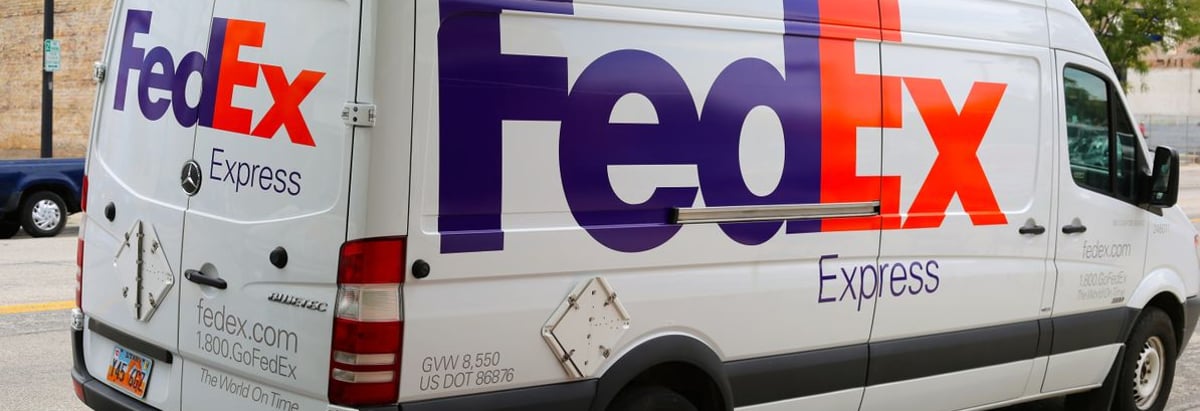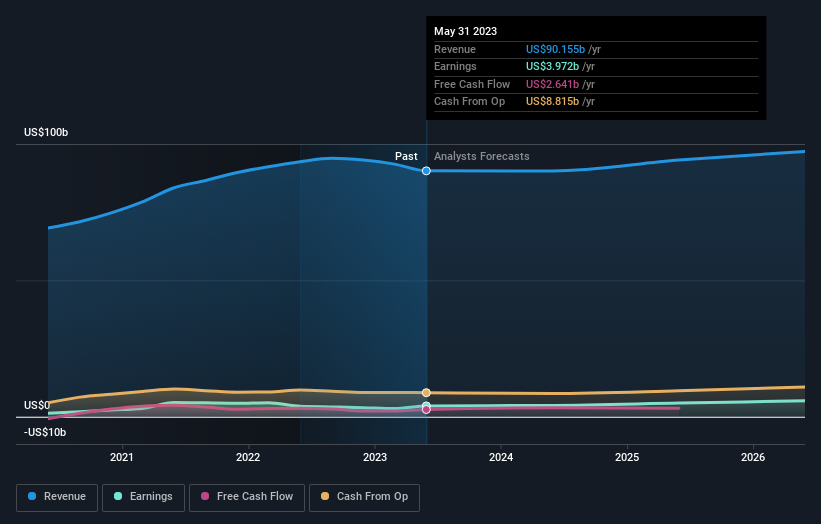- United States
- /
- Logistics
- /
- NYSE:FDX
FedEx Corporation's (NYSE:FDX) institutional shareholders had a great week as one-year returns increased after a 6.5% gain last week

Key Insights
- Significantly high institutional ownership implies FedEx's stock price is sensitive to their trading actions
- 50% of the business is held by the top 20 shareholders
- Insiders have been buying lately
To get a sense of who is truly in control of FedEx Corporation (NYSE:FDX), it is important to understand the ownership structure of the business. And the group that holds the biggest piece of the pie are institutions with 75% ownership. Put another way, the group faces the maximum upside potential (or downside risk).
And last week, institutional investors ended up benefitting the most after the company hit US$62b in market cap. The one-year return on investment is currently 5.2% and last week's gain would have been more than welcomed.
In the chart below, we zoom in on the different ownership groups of FedEx.
View our latest analysis for FedEx

What Does The Institutional Ownership Tell Us About FedEx?
Institutions typically measure themselves against a benchmark when reporting to their own investors, so they often become more enthusiastic about a stock once it's included in a major index. We would expect most companies to have some institutions on the register, especially if they are growing.
We can see that FedEx does have institutional investors; and they hold a good portion of the company's stock. This implies the analysts working for those institutions have looked at the stock and they like it. But just like anyone else, they could be wrong. If multiple institutions change their view on a stock at the same time, you could see the share price drop fast. It's therefore worth looking at FedEx's earnings history below. Of course, the future is what really matters.

Investors should note that institutions actually own more than half the company, so they can collectively wield significant power. Hedge funds don't have many shares in FedEx. Our data suggests that Frederick Smith, who is also the company's Top Key Executive, holds the most number of shares at 7.8%. When an insider holds a sizeable amount of a company's stock, investors consider it as a positive sign because it suggests that insiders are willing to have their wealth tied up in the future of the company. In comparison, the second and third largest shareholders hold about 7.5% and 6.7% of the stock.
A closer look at our ownership figures suggests that the top 20 shareholders have a combined ownership of 50% implying that no single shareholder has a majority.
While studying institutional ownership for a company can add value to your research, it is also a good practice to research analyst recommendations to get a deeper understand of a stock's expected performance. There are plenty of analysts covering the stock, so it might be worth seeing what they are forecasting, too.
Insider Ownership Of FedEx
While the precise definition of an insider can be subjective, almost everyone considers board members to be insiders. Company management run the business, but the CEO will answer to the board, even if he or she is a member of it.
I generally consider insider ownership to be a good thing. However, on some occasions it makes it more difficult for other shareholders to hold the board accountable for decisions.
Shareholders would probably be interested to learn that insiders own shares in FedEx Corporation. Insiders own US$5.0b worth of shares (at current prices). It is good to see this level of investment. You can check here to see if those insiders have been buying recently.
General Public Ownership
The general public-- including retail investors -- own 17% stake in the company, and hence can't easily be ignored. This size of ownership, while considerable, may not be enough to change company policy if the decision is not in sync with other large shareholders.
Next Steps:
It's always worth thinking about the different groups who own shares in a company. But to understand FedEx better, we need to consider many other factors. Consider risks, for instance. Every company has them, and we've spotted 1 warning sign for FedEx you should know about.
If you are like me, you may want to think about whether this company will grow or shrink. Luckily, you can check this free report showing analyst forecasts for its future.
NB: Figures in this article are calculated using data from the last twelve months, which refer to the 12-month period ending on the last date of the month the financial statement is dated. This may not be consistent with full year annual report figures.
New: AI Stock Screener & Alerts
Our new AI Stock Screener scans the market every day to uncover opportunities.
• Dividend Powerhouses (3%+ Yield)
• Undervalued Small Caps with Insider Buying
• High growth Tech and AI Companies
Or build your own from over 50 metrics.
Have feedback on this article? Concerned about the content? Get in touch with us directly. Alternatively, email editorial-team (at) simplywallst.com.
This article by Simply Wall St is general in nature. We provide commentary based on historical data and analyst forecasts only using an unbiased methodology and our articles are not intended to be financial advice. It does not constitute a recommendation to buy or sell any stock, and does not take account of your objectives, or your financial situation. We aim to bring you long-term focused analysis driven by fundamental data. Note that our analysis may not factor in the latest price-sensitive company announcements or qualitative material. Simply Wall St has no position in any stocks mentioned.
About NYSE:FDX
FedEx
Provides transportation, e-commerce, and business services in the United States and internationally.
Established dividend payer with adequate balance sheet.


